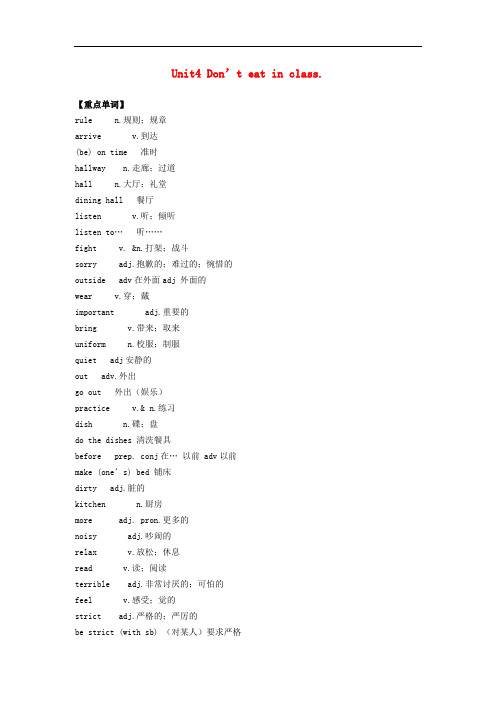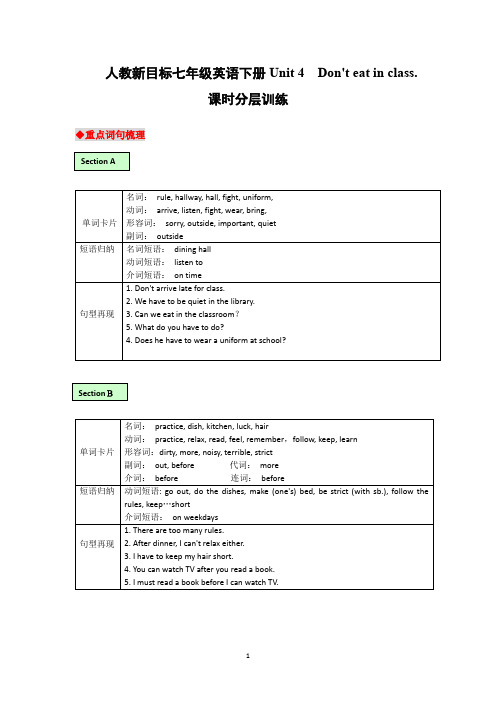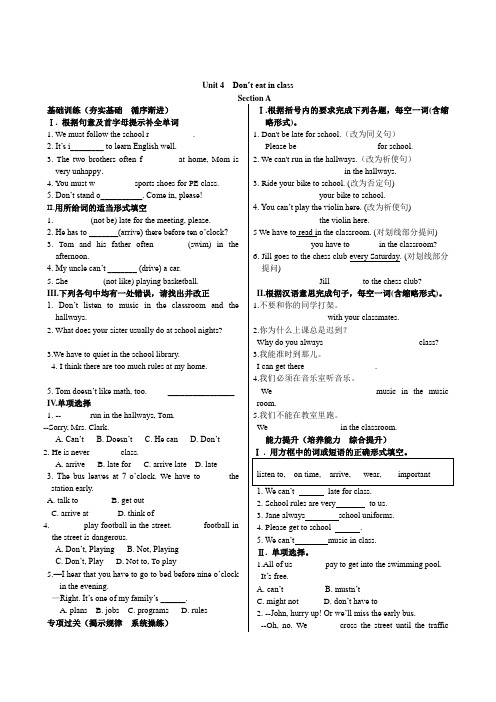2014年春新目标人教版七年级英语下册Unit4 Dont eat in class.-Section A-1-2精品课件
七年级英语下册 Unit 4 Don’t eat in class短语、句型、作文汇总 (新版)人教新目标版

Unit4 Don’t eat in class.【重点单词】rule n.规则;规章arrive v.到达(be) on time 准时hallway n.走廊;过道hall n.大厅;礼堂dining hall 餐厅listen v.听;倾听listen to…听……fight v. &n.打架;战斗sorry adj.抱歉的;难过的;惋惜的outside adv在外面adj 外面的wear v.穿;戴important adj.重要的bring v.带来;取来uniform n.校服;制服quiet adj安静的out adv.外出go out 外出(娱乐)practice v.& n.练习dish n.碟;盘do the dishes 清洗餐具before prep. conj在…以前 adv以前make (one’s) bed 铺床dirty adj.脏的kitchen n.厨房more adj. pron.更多的noisy adj.吵闹的relax v.放松;休息read v.读;阅读terrible adj.非常讨厌的;可怕的feel v.感受;觉的strict adj.严格的;严厉的be strict (with sb) (对某人)要求严格remember v.记住;记起follow v.遵循;跟随follow the rules 遵守规则luck n.幸运;运气keep v.保持;保留hair n.头发;毛发learn v. 学习;学会【重点短语】1. Don’t eat in class 在课堂上2. arrive late for class 上课迟到3. be on time 准时4.in the hallways 在走廊里5.in the dining hall 在餐厅6. listen to music 听音乐7 fight with…与某人打架8.Don’t eat in class. 不要在课堂上吃东西。
人教版英语七年级下册-Unit-4-Don't-eat-in-class-语法解析

2021/2/4
1
6
疑问句: must 提前,回答时注意一二人称的互换。肯定用 must, 否定用needn’t. e.g. --Must I go home now?
-- Yes, you must. -- No, you needn’t.
B: And I must clean my room every Saturday. =?
A: Wow, you do have a lot of rules!
2021Dr. Know, There are too many rules! At 6:00 a.m. my mom says, “Get up now and make your bed!”
too many rules “太多的规定”, 其中too many 用来 修饰可数名词复数rules。 e.g. He has too many friends to meet.
修饰不可数名词时, 要用too much e.g. We have too much work to do.
much too 太……much 用来增强语气。后接形容 词或副词。
What can I do. Dr. Know? Molly Brown, New York
表“看”的单词?
either 也。用于否定句和疑问句中。肯定句中用too 表也。
watch,see,look r,read
2021/2/4
1
13
Dear Molly, I know how you feel. People always tell us, “ Don’t do this!” or “You can’t do that!” But think about it, Molly. There are a lot of things you can do. You can play basketball on weekends. You can watch TV after you read a book. Parents and schools are sometimes strict,
新版新目标英语七年级下unit4__Don't_eat_in_class配套练习册答案 A-B

作文一 家有家规,校有校规。请以 “School rules” 为题,向新生Anna介 绍你们学校的一些规章制度。要求:条理清晰,意思连贯,语句通顺, 语法正确,书写规范。70词左右。 提示:1. 上课不能迟到;2. 教室要干净、安静; 3. 不允许在教室里吃东西; 4. 不允许在课堂上听音乐、玩游戏; 5. 见到教师要问好。
Section B Ⅵ. 1. are 2. them 3. and 4. can’t 5. has
Section B Ⅵ. 6. his 7. bring 8. keep 9. either 10. strict
Ⅶ. Hello, boys and girls! Welcome to the school library! ① 但是我们这里 有一些规矩。First, don’t talk. ② You can’t be nosy in the library. You have to be quiet here. Second, you can’t listen to music here. So you can’t bring your music player to the library. Third, ③you can’t bring your food to the library or eat it here. Fourth, you can’t take photos in the library.
Section B Ⅴ. 1. out 2. bad 3. on 4. after 5. rules
Section B Ⅴ. 6. before 7. dishes 8. make 9. too 10. clean
Mike is from America. Now he is in a school in Beijing. There are too many rules in his new school. Some of them are the same as the ones in America. Such as “Don’t eat in class, don’t fight and don’t arrive late for school.” But he can’t stand some of the rules. In America, he usually gets up at 8:00, but he has to get up at 6:00 here. He has to wear his
七年级英语下册Unit4Donteatinclass第1课时SectionA1a2c导学案人教新目标版

Unit 4 Don't eat in class.第一课时Section A(1a~2c)1.Key words and phrases:rule,arrive,hall,dining,listen,fight,sorry,outside,wear,important,bring,uniform,quiet,dining hall,arrive late for school,(be) on time,listen to…, go out,follow/break the rules,in class,be/keep quiet,a lot of,bring…to…,wear a hat,have to,music player2.Key sentences:(1)—Don't run in the hallways.—Sorry,Ms.Clark.(2)—What are(some of)the rules?—Well,we can't arrive late for class.(3)We must be on time.(4)We also have to be quiet in the library.3.Skills:(1)谈论校规,能正确使用否定祈使句陈述规章要求,对别人的劝告、警告做出礼貌回应。
(2)听清楚并能正确使用情态动词can,can't。
(3)能正确使用情态动词have to,must。
(4)能正确使用祈使句谈论规章制度。
4.Emotion:了解校规,规范在校行为。
5.The guidance of learning methods【学法指导】小组合作6.Learning important and difficult points【学习重难点】祈使句Don't…的用法。
(一)自主学习1.预习Page19-20中的生词,根据音标会读,知道汉语意思。
2014年春新目标人教版七年级英语下册Unit4--Dont--eat--in--class.-Se

9
Study in groups
What can we do at school? What can’t we do? And what do we have to do? Talk about school rules.
我知道! 我也会说!
第十页,共55页。
10
Are there any rules at home? What can you do? What can’t you do? And what do you have to do? Make a list.
×
watch TV
help his mom make
√
breakfast
√
clean his room
25
第二十五页,共55页。
合作探究
下面是do和名词搭配的几个例句:
1. Go and do your hair. 梳头
2. Do your teeth, please. 刷牙
3. Can you do the room now? 清扫房间
Language points
before dinner 饭前
before prep. & conj. 在……之前
adv. 以前 before + 时间点 I’ll be free before 7 o’clock tomorrow. 我明天7点前会有空。
第三十页,共55页。
30
Test
最快全对获优
b practice the guitar
g
do the dishes
watch TV
d help his mom make
f
breakfast
2014年春人教版七年级下册Unit 4 Don't eat in class period 3

• • • •
d ___ Help mother make breakfast at home. ___ b ___ Do the dishes after dinner at home. ___ h ___ Don’t see friends after school. ___ ___ f ___ Clean the room at home.
Do you go out to travel with your friends?
Yes, I do.
Do you often help your mother make dinner?
Yes, I do.
What do these signs mean?
a
c
e
g
b
d
f
h
Don’t go out on school nights.
• Do you have to do your homework after
school?
• Yes, I do.
Pairwork
Do we / you have to …?
School rules 1. Keep the classroom tidy and clean. 2. Get to school before 7:00. 3. Be polite. 4. Respect each other
c
Do your homework after school.
e
Practice your guitar every day.
g
Don’t watch TV after school.
Do the dishes after dinner at home.
人教版七年级英语下册教案与习题:Unit 4 Don't eat in class

Unit 4 Don't eat in class.Section A (1a-2d)一、教学目标:1. 语言知识目标:1) 能掌握以下单词:rules, arrive, late, hall, dinning hall, listen, listen to, fight, sorry2) 能掌握以下句型:①Don't eat in class.②You must be on time.③Eat in the dining hall.2. 学会用英语表达一些标志的含义。
3. 熟练使用目标语言谈论对某些规章制度(校规、家规等)的看法3. 情感态度价值观目标:能用英语表达和制定一些简单的规则,理解没有规矩不成方圆;无论是在学校时还是在家庭中以及以后走上社会都应当遵守规则,按规则办事。
二、教学重难点1. 教学重点:1) 肯定祈使句是省略掉主语的原形动词开头;2) 否定祈使句则是在肯定祈使句前加上“don’t”。
3) 情态动词must及have to在用法上的区别。
2. 教学难点:掌握祈使句的用法,并能听懂、会说一些简单的祈使句。
三、教学过程Ⅰ. Warming-up and revision教师进教室后,使用祈使句请学生们完成一系列动作:Please stand up/ sit down. Close the door, please. Look at me and listen to me.Don’t open your books. Don’t talk. Let’s begin our class.学生听教师的指令完成各种动作,教师也可将指令写到黑板上,让学生从视觉上考察祈使句的特点。
Ⅱ. Presentation教师出示书上1a 的图片,向学生提问。
指着图上奔跑的男孩提问T:What’s the boy doing? S: He’s running.T: Where is he running? S: He’s running in the hallways.(板书,教读)T:Can you run in the hallways? S: No, I can’t.T: So please don’t run in the hallways.(板书,教读)(= You can’t run in the hallways.)学生跟读数遍,明白祈使句和“can”的表达含意。
七年级英语下册-Unit-4-Don‘t-eat-in-class教案-(新版)人教新目标版

Unit 12 Don’t eat in class.I.教学设计分析本单元的中心话题是rules,主要语言功能是谈论并制定某些规章制度,如校规、班规和家规。
语言结构为祈使句。
利用情态动词can, must, have to 来谈论一些规章制度。
在Section A里通过活动与图片的配对,引出本部分中关于“学校的规章制度”及否定祈使句。
主要训练学生的听、说、演及其归纳总结的水平。
Section B主要通过一系列的句式进一步训练目标语言,并注意have to与 must, can与can’t的用法。
最后是要能使用所学的知识去制定一定的规则。
New languages:1.- Don’t run in the hallways. Don’t fight.2.-What are the rules? We must be on time for class.3.-Can we eat in the classroom?-No, we can’t, but we can eat in the dining hall.4.-Can we wear a hat in class? Yes, we can./ No, we can’t.5. - Does he have to wear a uniform at school?-Yes, he does. / No, he doesn’t.6. What do you have to do? We have to be quiet in the library.II. 教学学时分配Teaching periods:Period 1: Section A 1a -1cPeriod 2: Section A 2a -2cPeriod 3: Grammar Focus/ 3a -3cPeriod 4: Section B 1b -1fPeriod 5: Section B 2a-3c and self checkPeriod 6: Review Unit 1Unit 4 Don’t eat in class.Section A (1a-1c)1.Master the key words:rules, hallway, classroom, Mrs. fight, school rules.Master the sentences: 1). Don’t eat in class.2).You must be on time.3). Eat in the dining hall.2.Talk about the school rules.3.Listening and speaking skills and communicative competence.4. Encourage students to talk about the rules.5. To help Ss use the target language in natural speech.II. Key points1. Talk about the school rules and the target language.2. Learn to talk about the school rules.3. Imperatives Don’t...Difficult point:1. Talk about the school rules and the target language.2. Learn to talk about the school rules.III. Teaching aidsMultimedia/A tape recorder/A blackboardIV. Teaching proceduresStep1 Leading-inWarming-upT:What’s the woman doing? S: Sh e’s eating.T: Where is she eating? S: Sh e’s eating in class.T:Can you eat in class? S: No, we can’t.T: So please don’t eat in class.(= You can’t eat in class.)…Step 2 Presention1. T: Now, Look at the picture on your textbook. Each of the students is breaking one ofthese rules.Please finish 1a.1. Don’t arrive late for class. You must be on time.2. Don’t run in the hallways.3. Don’t eat in the classroom. You must eat in the dining hall.4. Don’t listen to music in class.5. Don’t fight.2. Listening1). T: Now let’s listen! What rules are these students breaking? Write the numbers after names?Peter ______ Amy ______ Mike ______2). Check the answers:3). Listen again and complete the conversation.Ms. Clark: Hey, Peter. You know the rules. Don’t _________________.Peter: Sorry, Ms. Clark.Mr. Smith: Amy, don’t _______________________.Amy: Oh, sorry, Mr. Smith.Mr. Smit h: Hey, Mike, don’t ______________ in class. Mike!Boy: He can’t hear you, Mr. Smith.Step3 ConsolidationPair workS.A is a new student. S.B is telling S.A about the school rules.Ask students to practice the conversation and make their own conversations.Ss work in pairs and practice saying the school rules.A: What are the rules?B: Well, we can’t arrive late for class. We must be on time.…Step 4 Summary1. Words: rules, arrive, late, hall, dinning hall, listen, listen to, fight, sorry Phrases: on time listen to… arrive/be late forSentences: 1. Don’t arrive late for class.You must be on time.2. Don’t run in the hallways.3. Don’t eat in the classroom. You must eat in the dining hall.4. Don’t listen to music in class.5. Don’t fight.2. Assign homework:1). Copy the new words (5E, 1C).2). Try to remember the words and expressions and use them freely.3). Write the rules in your school with“Don’t …. We can’t.... We must...”. V. Blackboard designUnit 4 Don’t eat in class.Section A1. Don’t arrive late for class.You must be on time.2. Don’t run in the hallways.3. Don’t eat in the classroom. You must eat in the d ining hall.4. Don’t listen to music in cla ss.5. Don’t fight.Teaching reflection:。
2014年春人教版七年级下册Unit 4 Don't eat in class period 4

Don’t eat in class.
Section B 2a~Self Check
What do these signs mean?
a
c
e
g
b
d
f
h
What are the rules in your family? Write your own family rule.
Fill in Dr. Know’s advice(建议).
Play basketball on weekends. 1. _________________________________ 2. __________________________________ Watch TV after reading a book.
Fill in Molly’s rules
make her bed. 1. _________________________________ 2. __________________________________ Don’t leave the dirty dishes in the kitchen. 3. __________________________________ Don’t be late for school. 4. __________________________________ Don’t be noisy, don’t eat in class, … She can’t play basketball after school . 5. __________________________________ She must do her homework. 6. __________________________________ 7. __________________________________ She can play only on weekends. She must read a book before She watches TV. 8. __________________________________ She has to go to bed before10:00. 9. __________________________________
人教版新目标英语七年级下册《Unit 4 Don’t eat in class Section B

人教版新目标英语七年级下册《Unit 4 Don’t eat in class Section B 1a-1d》教学设计9一. 教材分析人教版新目标英语七年级下册《Unit 4 Don’t eat in class Section B 1a-1d》主要讲述了学校的一些规则和行为准则。
本节课的主要内容是让学生能够听懂、会说、会读关于学校规则的句子,并能够运用所学知识进行简单的交流。
教材中1a-1d部分通过图片和句子呈现了学校的一些规则,如“Don’t run in the halls.”,“Put your things away.”,“Don’t talk during the test.”等。
二. 学情分析七年级的学生已经掌握了一些基本的英语知识,能够进行简单的听、说、读、写。
但是对于一些复杂的句子结构和词汇的理解还有一定的困难。
因此,在教学过程中,需要注重对句子结构和词汇的讲解,并通过大量的练习让学生能够熟练掌握。
三. 教学目标1.能够听懂、会说、会读关于学校规则的句子。
2.能够运用所学知识进行简单的交流。
3.能够正确使用情态动词“can”和“must”来表达能力和规则。
四. 教学重难点1.句子结构的理解和运用。
2.词汇的理解和运用。
3.情态动词“can”和“must”的用法。
五. 教学方法采用交际法、任务型教学法和情境教学法。
通过设定真实的情景,让学生在实际的语言环境中学习和使用英语。
同时,通过任务型的教学活动,让学生在完成任务的过程中提高英语交际能力。
六. 教学准备1.教学课件。
2.图片素材。
3.练习题。
4.录音机和磁带。
七. 教学过程1.导入(5分钟)通过复习上一节课的内容,引导学生进入本节课的主题。
老师可以提问学生:“你们知道学校有哪些规则吗?”让学生回忆起学校的一些规则,从而引起对本节课的兴趣。
2.呈现(10分钟)老师通过展示1a部分的图片,让学生听录音,并回答相关问题。
如:“What are the students doing?”,“What rule is the teacher telling the students?”通过这种方式,让学生理解和掌握1a部分的内容。
2014年春人教版七年级下册Unit 4 Don't eat in class period 2

Can you say something about your school rules?
We haபைடு நூலகம்e many rules in our school. We can’t fight.
We can’t wear a hat.
Activity can can can’t can’t
listen to music in the classroom or hallways listen to music in the music room
listen to music outside eat in the classroom
Learn new words
outside wear important bring player uniform quiet adv. 在外面 adj. 外面的 v. 穿;戴 adj. 重要的 v. 带来;取来 n. 播放机;运动员 n. 制服;校服 adj. 安静的
Talk about your school rules
eat in the dining hall eat outside
can can
can can
can’t can’t
can’t can’t
wear a hat
fight
can
can
can’t
can’t
Practice
Can we …? Yes ,we can . No, we can’t.
• eat in class • listen to music outside • wear hats in school • fight in class • speak loudly in the library
人教新目标七年级英语下册Unit 4 Don't eat in class.课时分层训练

人教新目标七年级英语下册Unit 4Don't eat in class.课时分层训练◆重点词句梳理第1课时分层训练[Section A11a2d]Ⅰ.根据句意及首字母提示补全单词1.Kim, don't stand o________. Come in, please.2.—Peter, remember to b________ your homework to school.—OK, Miss White. 3.I'm s________ to hear that you lost your job.4.The girl often w________ a red skirt.5.We need a q________ place to do our homework.Ⅱ.用所给单词的适当形式填空1.Mary is only four years old, but she can ________(read) books.2.________(not arrive) late for class.3. He ________ (have) to ________ (wear) his school uniform every Monday.4.Don't ________ (fight) with your friends, please.5. What are the ________ (rule)?Ⅲ.根据汉语意思完成句子,每空一词1.我爷爷喜欢听收音机。
My grandfather likes ________ ________ the radio.2.他们在学校得穿校服吗?Do they ________ ________ wear ________ at school?3.王华经常在餐厅吃早餐。
Wang Hua often eats breakfast ________ ________ ________ ________.4.抱歉,你们不能在走廊里大声说话。
人教新目标版初中英语七年级下册Unit4 Don’t eat in class课时练习题含答案

Unit 4 Don’t eat in classSection A基础训练(夯实基础循序渐进)Ⅰ. 根据句意及首字母提示补全单词1. We must follow the school r __________.2. It’s i________ to learn English well.3. The two brothers often f________ at home, Mom isvery unhappy.4. You must w_________ sports shoes for PE class.5. Don’t stand o__________. Come in, please!II.用所给词的适当形式填空1. ________ (not be) late for the meeting, please.2. He has to _______(arrive) there before ten o’clock?3. Tom and his father often _______(swim) in theafternoon.4. My uncle can’t _______ (drive) a car.5. She ________(not like) playing basketball.III.下列各句中均有一处错误,请找出并改正1. Don’t listen to music in the classroom and thehallways. ________________ 2. What does your sister usually do at school nights?________________3.We have to quiet in the school library. ___________4. I think there are too much rules at my home.________________ 5. Tom doesn’t like math, too. ________________ IV.单项选择1. --_______run in the hallways, Tom.--Sorry, Mrs. Clark.A. Can’tB. Doesn’tC. He canD. Don’t2. He is never _______class.A. arriveB. late forC. arrive lateD. late3. The bus leaves at 7 o’clock. We have to______ the station early.A. talk toB. get outC. arrive atD. think of4. _______ play football in the street. _______football in the street is dangerous.A. Don’t, PlayingB. Not, PlayingC. Don’t, PlayD. Not to, To play5.—I hear that you have to go to bed before nine o’clockin the evening.—Right. It’s one of my family’s ______.A. plansB. jobsC. programsD. rules专项过关(揭示规律系统操练)Ⅰ.根据括号内的要求完成下列各题,每空一词(含缩略形式)。
人教新目标英语七年级下册:Unit 4 Don't eat in class. Period 2 (

Name Group ClassTitle: Unit 4 Don’t eat in class? Period 2 (Section A 2d-3c) Topic: Talk about rules【Get ready before class 】 温故知新复习下列句子并译成中文(B)1. 不要在上课时听音乐。
2. 我们必须准时。
3. 我们能把音乐播放器带到学校里来吗?4. 在图书馆里我们必须保持安静。
5. 不要在楼道里跑 。
新知探究一、预习课本Section A 2d 对话,回答下列问题。
(A)1. Is John new at school?2. Are there many rules at school?3. Can he bring music players to school?4. Do they have to always wear the school uniforms?二、Listen and read the new words from Section A 2d-3c.生词,摘抄并翻译:单词所在的句子。
(B)have to: 原句 翻译:Please follow the rules at school!quiet: 原句翻译:uniform: 原句翻译:三、预习指南1. have to1)是情态动词,强调客观上要求“不得不,必须”,后接动词原形,有时态和数的变化。
如:It’s too late. I___________ go home now. 天太晚了,我现在必须回家了。
2)其否定句和疑问句要借用助动词do,does或did完成。
如:___________we have to finish the homework today? 我们必须今天完成家庭作业吗?My brother ___________have to go to school this afternoon.今天下午我弟弟不必上学了。
- 1、下载文档前请自行甄别文档内容的完整性,平台不提供额外的编辑、内容补充、找答案等附加服务。
- 2、"仅部分预览"的文档,不可在线预览部分如存在完整性等问题,可反馈申请退款(可完整预览的文档不适用该条件!)。
- 3、如文档侵犯您的权益,请联系客服反馈,我们会尽快为您处理(人工客服工作时间:9:00-18:30)。
2. Master the target language:
3 . Train students’ listening and speaking skills .
Self-study自主学习
Turn to Page 123, read the new words on Page 19
要求会读、会拼 、2分钟
3) 系动词be与形容词或介词短语联用,是英 语一种常见的语句结构,表示某种状态。 例如: be quiet 保持安静;be strict 要求严格 be on time 守时;按时到; be at work 在上班 例如: You mustn’t be noisy, children. 孩子们,你们一定不可喧闹。
No eating. No drinking.
Emergency Exit
Wet Floor
We always say:
Nothing can be accomplished without
norms or standards.
无规矩不成方圆。
拓展延伸
Do you know the places that have rules? And what rules do you know?
最快 全对
C(
)5.-Can your brother swim? -______. 获优 A. Yes, he can’t B. Yes, please . C. No, he can’t D. Yes, he does
1.听写P19面的单词 2. 背默1a 3. 预习2a-2d
Unit 4
Don’t eat in class.
3. Don’t listen to music in class. 别在课上听音乐。 listen to … 听„„ She is listening to the radio. 她在听收音机。
listen at the door 耳朵贴着门听 listen for … 留神等着听… listen for an answer 等着听回答 listen to a lecture 听讲座 listen to advice 听从劝告
A: Can we play it in the classrooms? B: No, we can’t. But we can play it outside. Don’t play sports in the classrooms. Play sports outside.
1a Which rules are these students breaking? Write the number of the rule next to the student. SCHOOL RULES 1. Don’t arrive late for class. You must be on time. 2. Don’t run in the hallways. 3. Don’t eat in the classroom. You must eat in the dining hall. 4. Don’t listen to music in class. 5. Don’t fight.
A: What are the rules? B: Well, we can’t arrive late for class. We must be on time.
1.组内争优! 2. 组间PK! 3.全班摘星 !
疑难点拨
1. Don’t arrive late for class.
不要上课迟到。
3 . Train students’ listening and speaking skills .
Self-study自主学习
Turn to Page 123, read the new words on Page 20
2a Listen. Check (√) the activities Alan and Cindy talk about.
(
can eat in the cafeteria. But we _______ eat in the C )1.We classroom.
A. don’t B. didn’t B. late for C. can’t D. aren’t D. late
Test
(
( (
B )2.He’s never ________ class.
合作探究
Discuss in groups
What can we do at school?
What can’t we do at school?
1. 组内合作! 2.全班展示 !3分钟
be late for class = arrive late for class
A: Can we be late for class? B: No, we can’t. We can’t be late for class. Don’t be late for class.
Unit 4
Don’t eat in class.
Section A Period 1 (1a-1c)
1. Master new words: rule, arrive, be on time, hallway, hall, dining, listen, listen to, fight, sorry
1.独立完成! 2. 组内互查! 3.全班展示 !2分钟
Activity
1.___ listen to music in the can can can can’t can’t can’t
classroom or hallways
2.___ listen to music in the music
room
Section A Period 2 (2a-2d)
1. Master new words: rule, arrive, be on time, hallway, hall, dining, listen, listen to, fight, sorry
2. Master the target language:
A: Can we eat in the classrooms? B: No, we can’t. We can’t eat in the classrooms.
Don’t eat in the classrooms.
A: Can we eat in the dining hall?
Bning hall.
3.___ listen to music outside
4.___ eat in the classroom
can
can’t
5.___ eat in the dining hall 6.___ eat outside 7.___ wear a hat 8.___ fight
can can’t can can’t can can’t can can’t
arrive vi. 到达
When did he arrive yesterday?
昨天他什么时候到达的?
arrive in / at与get to 的区别 ① My father arrived in / got to Beijing this morning. 我爸爸今天上午到达了北京。 ② The farmer arrived at / got to an old house and knocked at the door. 那个农民到达了一个旧房子前并且敲了敲 门。
We can eat in the dining hall.
A: Can we run in the hallways?
B: No, we can’t. We can’t run in the hallways. Don’t run in the hallways.
.
A: Can you fight? B: No, We can’t. We can’t fight. Don’t fight.
A. arrive A. smoke
C. arrive late
B )3. “ No______ !” says the sign. B
B. smoking C. smokes
D. to smoke
)4. -Can you cook fish? - ____. It’s easy. A. No, I can’t B. Yes, I can C. Sorry, I can’t D. Yes, I need
小结:
arrive + in (大地方)
at (小地方) get 必须与to 搭配才能加宾语。后面 如接地点副词,则不用介词to。
学为所用
– –
A in Shanghai? When did your uncle ______ The day before yesterday. A. arrive B. get
2b Listen again. Can Alan and Cindy do these activities? Circle can or can’t above.
1.独立完成! 2. 组内互查! 3.全班展示 !2分钟
A too late, the host will be unhappy. If you _____ A. arrive B. get to C. arrive at Don’t arrive (not arrive) late for class. ___________
2. You must be on time. 你们必须守时。 1) must 作为情态动词,表示“必须”、 “务必”,有时还表示“一定”,起到加 强语气的作用。例如: You must come tomorrow. 你(们)明天必须要来。 在回答must引起的问句时,如果是否定的答 复,可用don’t have to或needn’t (不必) , 但不能用mustn’t (一定不, 必须不, 不允许, 不得) 。
